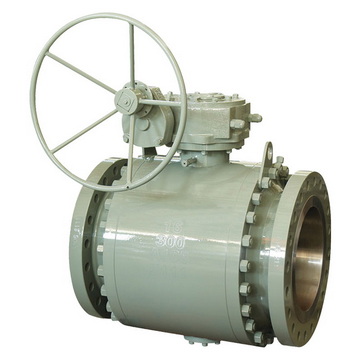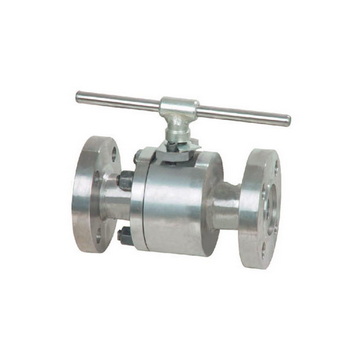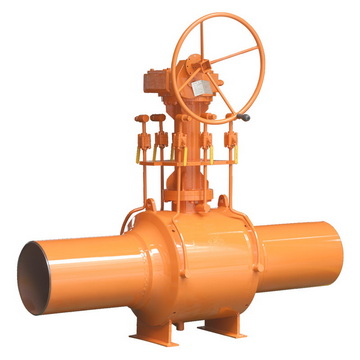Top Pneumatic Ball Valve Manufacturers and Suppliers in Europe
Content Menu
● What Is a Pneumatic Ball Valve?
>> How Pneumatic Ball Valves Work
● Key Features and Advantages of Pneumatic Ball Valves
● Leading Pneumatic Ball Valve Manufacturers and Suppliers in Europe
● Applications of Pneumatic Ball Valves
● Manufacturing Process of Pneumatic Ball Valves
● Integration with Control Systems
● Industry Trends and Innovations
● Frequently Asked Questions (FAQ)
>> 1. What are the advantages of pneumatic ball valves over manual valves?
>> 2. Which industries most commonly use pneumatic ball valves?
>> 3. Can pneumatic ball valves be customized?
>> 4. What certifications should I look for when choosing a manufacturer?
>> 5. How do pneumatic actuators work with ball valves?
Pneumatic ball valves are vital components used for controlling fluid flow in various industrial applications. Europe is home to some of the most advanced and reliable pneumatic ball valve manufacturers and suppliers, known for their high-quality products and innovative solutions. This article presents a comprehensive overview of the top pneumatic ball valve manufacturers and suppliers in Europe, highlighting their capabilities, applications, manufacturing processes, and reasons why they stand out in the global market.

What Is a Pneumatic Ball Valve?
A pneumatic ball valve is a type of ball valve that uses compressed air to actuate the valve mechanism. The valve consists of a spherical ball with a hollow center that rotates 90 degrees to control flow. The pneumatic actuator converts compressed air pressure into mechanical motion, enabling quick and reliable valve opening and closing. These valves are widely used in automated systems requiring fast response and remote control, ideal for harsh conditions involving high pressure, temperature, or corrosive media.
How Pneumatic Ball Valves Work
The valve operation begins when compressed air is supplied to the pneumatic actuator, which rotates the ball within the valve body. The rotation aligns or blocks the flow path through the hollow center of the ball, effectively opening or closing the valve. Depending on the actuator design, valves can be of single-acting (spring return) or double-acting types, allowing for fail-safe operation modes. Pneumatic ball valves are known for fast quarter-turn operation, tight sealing, and low flow resistance.
Key Features and Advantages of Pneumatic Ball Valves
Pneumatic ball valves offer numerous advantages, making them the preferred choice in many industrial environments:
- Automation Capability: Their compatibility with pneumatic actuators allows for seamless integration into automated production lines and remote control systems.
- Fast Operation: The quarter-turn mechanism enables the valve to open or close quickly, reducing downtime and improving process efficiency.
- Tight Sealing: High precision seats ensure minimal leakage, which is critical for handling hazardous or expensive fluids.
- Durability: Constructed typically from stainless steel, brass, or other alloys, these valves are designed to withstand corrosion, high pressure, and temperature extremes.
- Low Maintenance: Their simple mechanical design leads to fewer wear parts, reducing the frequency and cost of maintenance.
- Compact Size: Pneumatic ball valves combine high performance within a small footprint, saving space on complex piping systems.
These attributes make pneumatic ball valves invaluable in sectors requiring dependable flow control with minimal human intervention.
Leading Pneumatic Ball Valve Manufacturers and Suppliers in Europe
Europe hosts an array of reputable manufacturers known for producing durable, precision-engineered pneumatic ball valves. These companies serve industries such as oil and gas, chemical processing, water treatment, power generation, and marine applications. Their product lines include floating ball valves, trunnion-mounted ball valves, top entry ball valves, and customized OEM solutions tailored to client requirements.
European manufacturers emphasize advanced engineering, rigorous quality controls, and certifications such as ISO, CE, and API, underscoring their commitment to safety and performance. Many offer value-added services including valve automation, integration consultancy, and after-sales support, making them trusted partners for industries demanding stringent product standards.
Applications of Pneumatic Ball Valves
Pneumatic ball valves find application across a broad spectrum of industries thanks to their reliability, quick response times, and adaptability:
- Oil and Gas Industry: Critical for upstream drilling operations, midstream pipeline distribution, and downstream refining, pneumatic ball valves offer accurate flow regulation, pressure control, and shutoff capabilities essential to safety and efficiency.
- Chemical Processing: Their material compatibility with corrosive or aggressive chemicals combined with high-temperature resistance ensures safe and leak-free operation in chemical plants.
- Water and Wastewater Treatment: Used in controlling the flow of potable water and waste streams, pneumatic ball valves contribute to environmental safety and resource optimization.
- Power Generation: From steam turbines to cooling water systems, pneumatic valves regulate flows with precision, supporting plant safety and operational consistency.
- Food & Beverage and Pharmaceutical Industries: Hygienic ball valves with smooth internal surfaces enable strict contamination control and easy cleaning, aligning with regulatory standards.
- Marine and Offshore Applications: Valves engineered to withstand seawater corrosion and harsh offshore conditions are essential for desalination, drilling platforms, and ship systems.
Their versatility in handling gases, liquids, and slurries under diverse operating conditions makes pneumatic ball valves a fundamental component in modern industrial processes.

Manufacturing Process of Pneumatic Ball Valves
Producing high-quality pneumatic ball valves involves a combination of precision engineering and stringent quality checks aimed at ensuring reliability and performance:
1. Design and Engineering: Using advanced CAD software, engineers create detailed valve models tailored to specific fluid dynamics, pressure ratings, and environmental conditions.
2. Material Selection: Manufacturers select high-grade alloys such as stainless steel, brass, or carbon steel. Material choice depends on application requirements including corrosion resistance, strength, and temperature tolerance.
3. Forging and Casting: Valve bodies and components are forged or cast to form robust foundations, followed by heat treatment to enhance mechanical properties.
4. Precision Machining: CNC machines shape internal valve parts to exact tolerances, guaranteeing smooth operation and proper fit between the ball, seats, and seals.
5. Surface Treatment: Coatings or surface finishes improve resistance to wear, corrosion, and abrasion, extending valve lifespan.
6. Assembly: Workers and automated systems assemble ball, stem, seals, seats, and the pneumatic actuator meticulously.
7. Rigorous Testing: Each valve undergoes pressure, leakage, and functional tests to verify integrity under operational conditions. Protocols often comply with international standards.
8. Certification and Documentation: Manufacturers provide compliance certificates and detailed technical documentation necessary for traceability and regulatory approvals.
Customization is a hallmark of European manufacturers, who can modify valve size, actuator type, seat materials, and pressure ratings according to client specifications.
Integration with Control Systems
Pneumatic ball valves are frequently integrated with control systems such as PLCs (Programmable Logic Controllers) for automated process management. Valve positioners, feedback devices, and sensors may be added to provide real-time monitoring and fine control over fluid flows. This integration improves safety, reduces manual intervention, and enhances process efficiency—vital attributes across industries with stringent operational requirements.
Moreover, pneumatic actuation offers advantages over electric or hydraulic actuation in hazardous environments, such as explosive atmospheres, due to the absence of sparks and potential electrical faults.
Materials and Seal Types
Material and seal selection directly impacts valve performance and lifespan. Common materials used include stainless steel grades (304, 316), carbon steel, brass, and special alloys for extreme environments. Seals can be made from PTFE (Teflon), Viton, EPDM, or PEEK, depending on the chemical compatibility, temperature, and pressure.
The choice between floating ball and trunnion-mounted ball valve designs also depends on pressure ratings and valve size. Floating ball valves are suitable for smaller valves and lower pressures, while trunnion-mounted valves provide reduced torque and better sealing for large-diameter and high-pressure applications.
Industry Trends and Innovations
European manufacturers continue to innovate in the pneumatic ball valve space by focusing on:
- Smart Valves: Embedded with sensors and IoT connectivity to enable predictive maintenance and remote monitoring.
- Eco-Friendly Manufacturing: Using sustainable materials and reducing waste and emissions in production processes.
- Lightweight Designs: Enhancing valve performance while reducing weight for easier handling and installation.
- Enhanced Sealing Technologies: Developing advanced multi-layer seals to improve chemical resistance and valve life.
- Expanded OEM Services: Custom solutions designed around client-specific process requirements including specialized actuator designs and valve automation packages.
These trends reflect the evolving needs of global industries striving for higher safety, efficiency, and environmental responsibility.
Conclusion
Choosing the right pneumatic ball valve manufacturer and supplier in Europe is critical for ensuring durable performance, precise flow control, and long service life in demanding industrial environments. Europe's top manufacturers combine advanced technology, customization options, and strong customer support to deliver outstanding valve solutions tailored for oil and gas, chemical processing, water treatment, power generation, and marine applications.

Frequently Asked Questions (FAQ)
1. What are the advantages of pneumatic ball valves over manual valves?
Pneumatic ball valves provide fast, remote, and automated operation with high reliability and tight sealing, unlike manual valves which require physical intervention and may be slower and less precise.
2. Which industries most commonly use pneumatic ball valves?
They are widely used in oil and gas, chemical processing, water treatment, power generation, pharmaceutical, food and beverage, and marine industries.
3. Can pneumatic ball valves be customized?
Yes, manufacturers offer customization options including size, material, pressure rating, actuator type, and special seal configurations tailored to client needs.
4. What certifications should I look for when choosing a manufacturer?
Look for ISO, CE, and API certifications which indicate compliance with international quality and safety standards for industrial valves.
5. How do pneumatic actuators work with ball valves?
Pneumatic actuators use compressed air to rotate the valve's ball 90 degrees, opening or closing the flow path quickly and reliably, with fail-safe designs such as spring-return single acting or double acting actuators.
Hot tags: Top Pneumatic Ball Valve Manufacturers Europe, Best Pneumatic Ball Valve Suppliers in Europe, European Pneumatic Ball Valve Companies, Industrial Pneumatic Ball Valves Europe, Pneumatic Actuated Ball Valve Europe, Buy Pneumatic Ball Valves Europe, High Quality Pneumatic Ball Valves Europe, Leading Pneumatic Ball Valve Brands Europe, Pneumatic Ball Valve Exporters Europe, Europe Pneumatic Ball Valve Manufacturers Directory